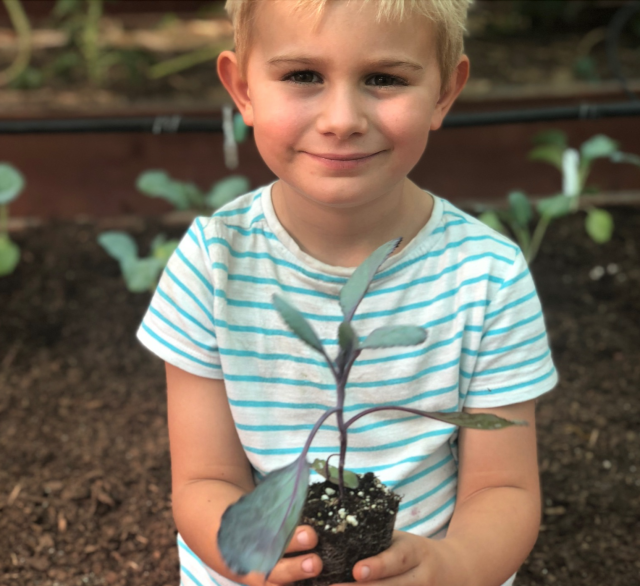I became passionate about zero waste when I first became a mom because it made me realize that this is her planet and her future on the line and that I need to fight to make sure my kids can grow up with a healthy planet. When we decided that we would become zero waste, in addition to being good role models for our kids, it also meant that we would spend less money and time on buying things and allow us to work less so we can both spend more time with our kids—a benefit for all of us.
Teaching my kids about the value of the environment and the importance of preserving the world around them is an ongoing task. I’m raising three eco-minded kids: Isabella, 14; Noah, 10; and Liam, 8. My goal is always to make our day-to-day routines ones that also teach them to care for the environment. Here is how I do it:
Gardening
Gardening and kids are a natural mix involving dirt, digging and water—children’s favorites. Our garden is also a great classroom where my kids learn science, biology and even math. We grow lots of vegetables and fruit. My children have learned how to plant a seed, which then sprouts, becoming a seedling that we then plant in our garden bed. They have learned that, for the plant to grow, it needs water, compost and sun. They also have learned how to provide these basics. Our children also understand how plants eat carbon, and that plants also clean the air. They have learned how our bunny and chicken poop helps our garden. They have learned the important role of plants, bushes and trees on our planet, and how we simply can’t cut down all trees and remove green patches without replacing them in order to conserve our planet.
Composting
I believe it is important that we teach children to protect and restore the environment. Educating kids about composting is surely a great way to start. Composting truly is one of Mother Nature’s most miraculous processes. Using only natural means to implement what usually is garbage, we’re able to turn “waste” into one of the most beautiful and productive growing mediums. Composting also teaches children how to reduce waste and keep it from going to a landfill. My kids now know that food waste in a landfill becomes methane gas, a potent greenhouse gas, whereas food waste in compost becomes powerful nutrients for our garden. A huge garden—or any garden at all—isn’t necessary to have compost. As a matter of fact, composting can be done in an apartment.
Recycling
Sorting through recycling is a surprisingly fun activity for my kids; whether on a hiking trail or on the beach, they will pick up litter to recycle. It’s also a good task to perform with kids so they learn what can and cannot go into a recycling bin. Recycling, just like composting, is a way to teach children how we can keep our waste from ending up in a landfill and how this can help save the planet. My kids even take it to the next level and will look in the recycle bins for materials for arts and crafts.
Spending Time in Nature
There’s no better way to connect with nature and help children appreciate our planet than getting outdoors. It’s so great to see how almost anything—ants, worms, wildlife, mushrooms, flowers, funny looking trees, puddles and ice—can catch their attention forever. (I have an array of stones, twigs, leaves and other items from nature that were just so special and had to be saved.) Nature is a wonderful classroom where we can teach our children the importance of taking care of all the trees and water since they are homes for all the world’s wonderful treasures. My children also like to write in their nature journals about what they see, feel and experience when out and about, which gives them time to reflect and preserve memories. If your children enjoy spending time outdoors, they’ll more likely do everything they can to protect these green spaces and ensure they exist in the future.
Volunteering
My family love volunteering together, so we clean beaches with Surfrider, collect food waste from our local farmers markets to give to families in need with Produce Goods. And we cook dinner at the Ronald McDonald House. All these activities help my kids give back. They are learning how they can help strengthen our community, keep the beaches clean that provide so much fun, keep food waste out of landfills, and help those in need.
Being a Good Role Model
I know my kids watch us parents to see how we behave and react, so it’s important that we are good role models. To this end, we show our kids how to be Earth-friendly by being Earth-friendly ourselves. Seeing our behavior will reinforce the importance of respecting our planet more than any verbal lesson.
Never in history has it been more important to encourage children to be green, to raise ecologically conscious children. I firmly believe I’m raising the next leaders for new innovations to care for our planet and make it livable for future generations.
—Fredrika Syren, Zero Waste Family











